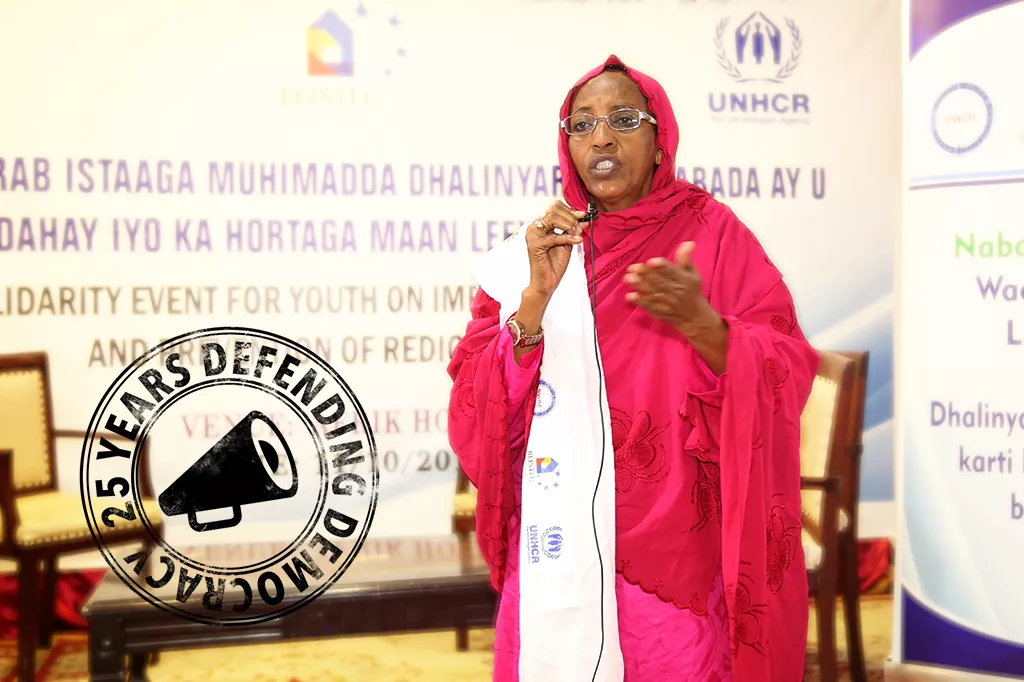An inspiring woman encouraging women and girls to stand up for their rights

In 2000, when many felt it was not yet safe to return, Zahra was brave enough to return to her country and immediately started a Community-Based Organization – HINNA, raising funds to open up hospitals and schools and engaging dialogue with militiamen and warlords to put down their guns and pick up the pen.
To break the vicious cycle of violence and inequality against women and girls, Zahra later founded Somali Women Development Centre (SWDC), a Community-Based Organisation (CBO), where she currently works as the legal advisor and director. The organisation documents, monitors and reports on human rights violations and cases of abuse that are happening in Somalia. SWDC also provides free and unconditional legal assistance and advocacy to women and girls who had survived violence.
“Unfortunately, during conflict, it is women and children who bear the brunt of the damages and loss caused by such confrontations. As women, we mobilised ourselves and talked to our sons, husbands and other male relatives to put down the gun and pick up the pen. It was not easy. The city was divided along clan militias with tens of roadblocks and movement was not easy within the city. Some health facilities and schools were also used by the militiamen for their activities.” She said.
As women, we mobilised ourselves and talked to our sons, husbands and other male relatives to put down the gun and pick up the pen.
Through Zahra’s effort and her women colleagues, they managed to successfully demobilise militia groups by first convincing them to remove roadblocks in the city and handover the Banadir health facility. The militiamen and warlords finally gave in to their demands and HINNA immediately mobilised resources from businesses and civil society organisations and established two camps meant to host the militiamen for rehabilitation and training them on income-generating activities. The city opened up and life started to return to normal, however, this effort was short-lived as it was very expensive to sustain such camps with little support from the international community.
As the conflict continued to rage the country, Zahra was disturbed by the suffering of women and girls in a city filled with callous militiamen. The city was home to about half a million internally displaced people, living in makeshift houses made from sticks and plastic bags. Women and girls were facing serious protection concerns, including sexual and gender-based violence. To enhance her work in addressing such abuses against women and girls, Zahra enrolled for a degree in International and Sharia Law which she successfully graduated in 2005.
Now armed with only a degree and the local organisation she just started, the 69-year-old mother embarked on door-to-door advocacy, calling for life free from violence for women and girls in Mogadishu. With little support and funding available, she coordinated her activities with multiple like-minded organisations in Mogadishu to jointly push for change. Zahra would engage clan elders, warlords and religious leaders to jointly address the violence against women and girls. She would ask religious leaders and mosques imams to talk about the violence in the Friday summons and other routine lectures.
I thought I should push for gender balance in courts and police stations by supporting our girls who want to enrol for law courses and those who want to join the police force.
“The gender-based violence was common and perpetrators of such violence could walk freely and survivors feared for their lives to report such cases. To address this, we created a lot of sensitization and advocacy on how to collaboratively address the vice. In the courts and police stations, there were only male staff and this discouraged female survivors from reporting cases. I thought I should push for gender balance in courts and police stations by supporting our girls who want to enrol for law courses and those who want to join the police force.” She said.
The effort by Somali Women Development Centre (SWDC) in addressing violence against women and girls was noted and hailed by the international partners such as the UN and the Somali diaspora who have started supporting her work. Since there were few women lawyers and prosecutors, Zahra inspired and supported girls who wanted to pursue law courses at the local universities and after their graduation, provided one-year internships at her local organisation and lobbied others to be employed by the relevant ministries and institutions such as the ministry of justice and Parliament. Her local organisation have since supported and provided internships to hundreds of girls who are now prosecutors in the courts, some at senior level both at the ministry of justice and regional and national Parliament in the country. Zahra also established free hotline numbers where survivors can call for support and free legal aid.
The gender-desk have encouraged women to report cases of violence to the police, building trust and bond between the community and the police.
Thanks to Zahra’s effort, there are today more women in the police force who have been trained by SWDC on gender-based case management, referral mechanism and counselling services. Almost all police stations in Mogadishu have a gender-desk managed by a female police officer trained to document cases of violence against women. The gender-desk have encouraged women to report cases of violence to the police, building trust and bond between the community and the police.
Zahra’s local organisation was also part of a network of women who advocated for improved representation in the Parliament. For instance, women made some progress in the 2017 election, women now constitute 24% of the Somali federal Parliament and 20% of the Council of Ministers. Through the effort of women’s rights defenders like Zahra, the electoral law was passed in both houses of Parliament and approved by the president in February 2019 and will see more women in representation as the country prepares for one-person-one-vote process in the 2020/2021 election as a replacement for clan-based-power-sharing.
Civil society organisations in Somalia face numerous challenges including constant death threats from armed groups, perpetrators, family and sometimes even the government. SWDC’s activists have in the past been arrested by the state authorities in their line of duty. Two of SWDC’s lawyers were killed by Islamist militants during the attack on the courthouse in Mogadishu in 2013, which claimed the lives of 29 people and left 60 wounded.

Change begins with people. People who raise their voices, who work together and who organise to demand democracy, equality, accountability and human rights. We want to tell you about the people and organisations that are fighting for a better life, for everyone. With the campaign Changemakers we give you an insight into how Forum Syd works to create change through our support to civil society and human rights defenders around the world.
Andra nyheter

The power of people powered Public-Private Partnerships
Public–Private Partnerships (PPPs) are often discussed in terms of roads, power plants, housing, and other large infrastructure projects. But as discussed on the People’s Partnership Podcast, PPPs are...

ForumCiv’s social media accounts labelled as “extremist materials” in Belarus
Important message to our Belarusian followers. Any interaction with our content can now lead to legal consequences in Belarus. Please read the information below and take the necessary precautions for...

ForumCiv enters new strategic partnership
ForumCiv is proud to announce a new three-year strategic partnership with Sida, totalling SEK 137 million.